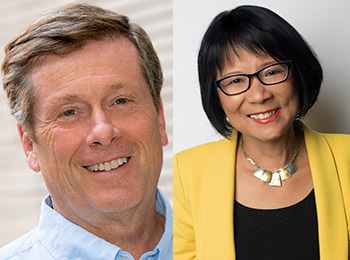TORONTO — Toronto’s leading mayoral candidates John Tory, Olivia Chow and Doug Ford will square off at a debate hosted by the Centre for Israel and Jewish Affairs (CIJA) and United Jewish Appeal (UJA) Oct. 5 at the Anne and Max Tanenbaum Community Hebrew Academy of Toronto’s Wilmington campus.
Howard English, vice-president of CIJA for the Toronto region, said the debate, moderated by National Post columnist Chris Selley, will feature topics such as community social services, public transit and affordable housing.
“The debate is an opportunity for those who join us to consider key issues from a Jewish community lens,” English said. “Hopefully, it will also encourage Jewish community members to vote in significant numbers for the candidates of their choice. Our community’s collective voice is much stronger the more we participate in the political process.”
Tory told The CJN he expects the debate will address issues of concern to the Jewish community in particular and Toronto citizens more generally.
“I come from the place that most citizens of Toronto, whether they are Jewish or of another faith or background, care about many of the same things, like the traffic and transportation nightmare that is Toronto in 2014, the need to attract and create more jobs, and making sure we keep the city finances in good order,” he said. “I also anticipate issues coming up that have to do with security and anti-Semitism.”
Tory said he’s well positioned to address issues that concern Jewish voters.
“I understand these issues not just because I’ve read them on a piece of paper, but because I’ve sat with people in the community… and listened to them express their concerns. For example, it isn’t so much the expense involved in hiring people to provide security at religious institutions [that’s upsetting], but the whole principle that, in the City of Toronto, we don’t want to accept the notion that anyone should have to have armed security at religious institutions.”
He added: “The issue becomes not just doing everything we can as a community to provide that security through the Toronto Police Service, but addressing the root causes of [anti-Semitic incidents and hate crimes].”
Chow told The CJN she has a long history of working with the Jewish community on human rights and anti-hate initiatives. She referred to work she did as an MP, helping to push for federal funding for improved Holocaust and genocide education in schools.
“My entire campaign is based on the value that no one be left behind, that everyone counts no matter their income, religion, what colour they are or what neighbourhood they live in,” she said.
“It’s important that we focus on building a city that respects human rights and equality. The Jewish community has, historically, been at the forefront of issues of justice and making sure people are not left behind.”
The UJA/CIJA debate will follow one Sept. 19 between Chow and Tory hosted by the Friends of Simon Wiesenthal Center for Holocaust Studies, in which they fielded questions about hate crimes against Jews and synagogue security.
They primarily diverged on whether the city should continue to fund the annual Pride parade if the group Queers against Israeli Apartheid (QuAIA) marches in it: Tory believes QuAIA’s participation in the parade warrants pulling city funding from Pride, while Chow said she disagrees with the group, but doesn’t believe funding should be cut over this issue.
“I’ve had a longstanding position on this that I continue to hold to,” Tory told The CJN. “I’m a huge supporter of Pride and have helped them when they were struggling to find sponsors in past, but I think this is an important matter of principle… the term ‘Israeli apartheid’ is offensive not just to Jews or Israelis, but to a lot of people who understand what apartheid in South Africa was really like.”
Chow stressed she doesn’t support QuAIA or what it stands for, but agrees with the city solicitor’s ruling that the group doesn’t violate anti-discrimination laws. Further, she suggested that pulling city funding for Pride would likely only serve to “give [QuAIA] more oxygen, or publicity.”
English said that the subject of Pride and QuAIA isn’t slated as a formal topic of discussion at the debate.
Efforts to reach Ford for comment on the debate were unsuccessful.
